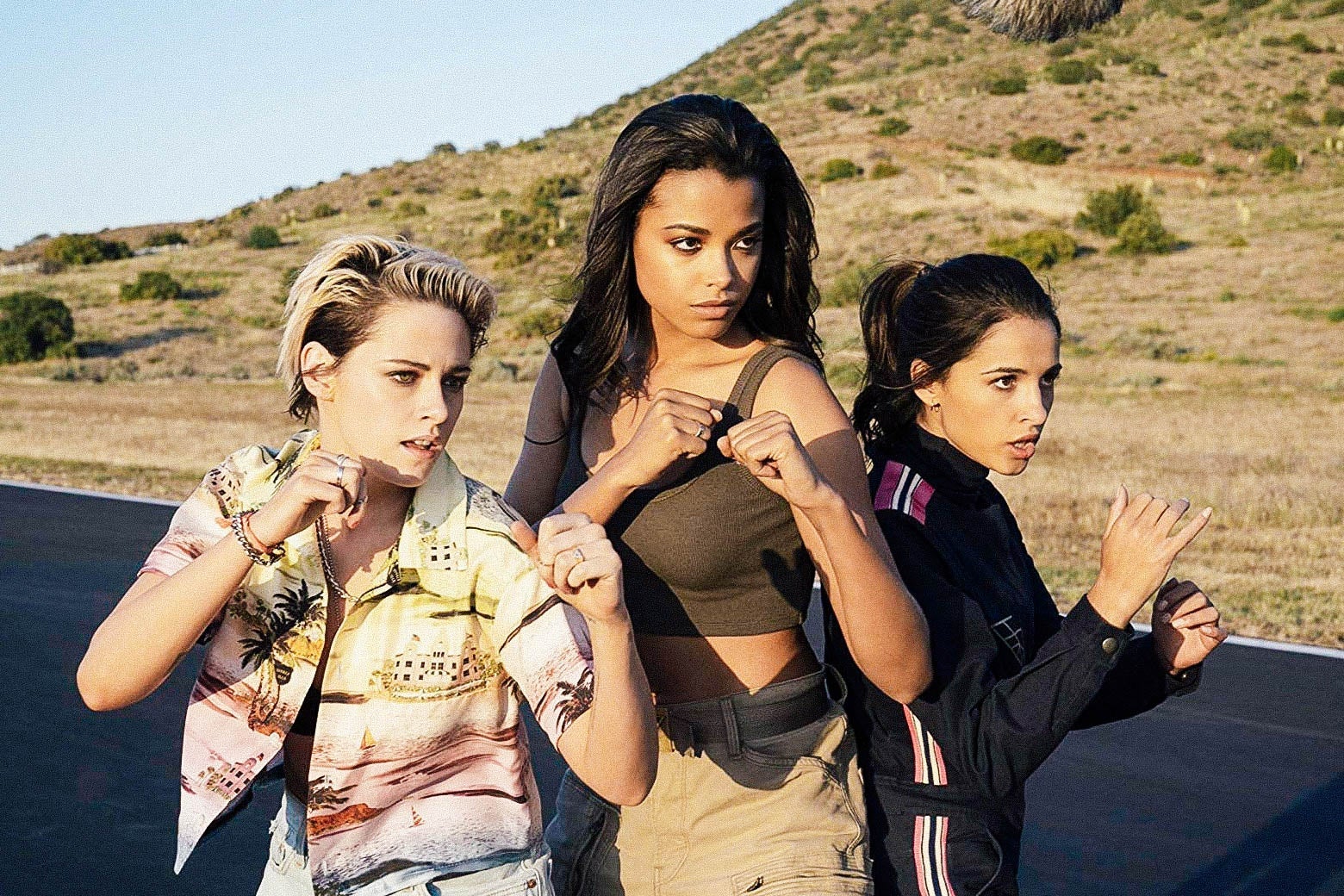It’s shockingly easy to imagine a near future in which the Charlie’s Angels franchise becomes one of the most valuable pop cultural artifacts of feminism’s evolution over the past half-century. Since its debut in 1976, this series of superspy movies and TV shows has always mirrored—and managed—anxieties about female power. Premiering during the same decade as The Mary Tyler Moore Show, the original Aaron Spelling–produced TV series glamorized women’s work outside the home and expanded viewers’ notions of what that work could be. At the same time, it made its central trio—all white, of course—beholden not just to a never-seen male boss (Charlie) but also his male assistant (Bosley). When it was remade two decades later in 2000 and 2003 as feature films by Joseph McGinty Nichol, the director better known as McG, the Angels became acrobatic pugilists (thanks to slo-mo “wire fu” stunts that recalled The Matrix and any number of wuxia movies) as well as hypersexualized ditzes who giggled their way around the world. They also gained an Angel of color in Lucy Liu’s Alex, who posed as a masseuse while her co-workers dressed in black bobs and Halloween-store kimonos to the tune of “Turning Japanese.” (Thank god it’ll never be the early 2000s again.)
The latest iteration of Charlie’s Angels, unsurprisingly, is an extremely 2019 studio movie: self-consciously feminist (at one point a character sarcastically exclaims “girl power!”), notably diverse (while avoiding the subject of race), and painfully generic. It’s also the first Charlie’s anything to feature a woman behind the camera: Elizabeth Banks writes, directs, and co-stars as the first Angel to be promoted to Bosley status. The film is stuffed with noble intentions, starting with an early montage of anonymous girls and young women doing kickass things. But Banks’ vision of women-empowerment heaven plays more like a checklist of topics from the feminist discourse of the past few years than a coherent movie, let alone a crowd-pleasing one. The squeaky-clean cheerleading and “amirite, ladies?” elbowing meant to lull me into a state of sisterly contentment just made me miss McG’s sleazy camp.
The old movies also had going for them the combined star power of Cameron Diaz, Drew Barrymore, and Liu. The new one is let down by the next class of Kristen Stewart, Ella Balinska, and Naomi Scott, that latter two relative newcomers. The less said of the rote plot—involving a dangerous new technology on sale and a suspected mole in Charlie’s agency—the better. Scott’s Elena, a wunderkind computer programmer turned whistleblower, serves as the audience surrogate as she’s recruited into the crime-fighting organization, but even the movie doesn’t quite believe in her character as a wide-eyed Everywoman, undercutting her biggest dramatic monologue with a bit of “aren’t you cute” rug-pulling. Stewart’s party-girl Sabina and Balinska’s Type A Jane are presented at loggerheads, but their gradual turn toward friendship and cooperation has little bearing on the plot and never reaches a point of genuine chemistry.
Overlaying the proceedings are the movie’s many hapless attempts at female solidarity. Some, like the scene in which the Angels brag that their bulletproof bras don’t dig, or the one where Sabina tells newbie Elena to swap her stilettos for sneakers when approaching the bad guys, are more organic to the story. Others, especially the ones Banks gives herself, wouldn’t be out of place in a Cathy strip. Her Bosley loves wine, grumbles about dating as a 40-year-old woman, and observes, “all women are starving all the time,” which seems a lot truer to the experience of Hollywood actresses than to that of a cadre of supersoldiers constantly on the run. (The three cheeseburgers that Barrymore’s character orders for herself in the old movie sounds like “cool girl” bullshit until we remember that the Angels spend every other scene chasing after bad guys.) Even more annoyingly, Charlie is revealed to be a woman affecting a man’s voice—a third-act “spoiler” that isn’t really one because it has nothing to do with anything else in the movie. The recommendations of the goofy “wellness” coach (Luis Gerardo Méndez) who looks after the Angels’ health suggest that Banks’ dreams of gender equality resemble those of Gwyneth Paltrow. While the past few years’ explosion of moving women-centric stories in theaters and on television has often relied on the specificity of lived experience, here the feminist makeover feels like little more than a rebranding.
None of this would matter much, of course, if the film were fun. An early heist sequence does squeeze some mild amusement out of the franchise’s long-running reliance on wigs and outfit changes, hiding the leads under matching feathered bowl cuts (in a nod to the ’70s series) in order to play a sort of shell game with the audience, but the energy dissipates quickly. The hand-to-hand combat is refreshingly realistic for women of the actresses’ size, but the action sequences by and large feel obligatory. Where Charlie’s Angels really falters, though, is in the jokes, as Banks is the only actress on screen with any real comic chops. One can’t help wondering what might’ve been if she’d concerned herself more with being her weird self and less with trying to make every woman in the audience feel validated.
